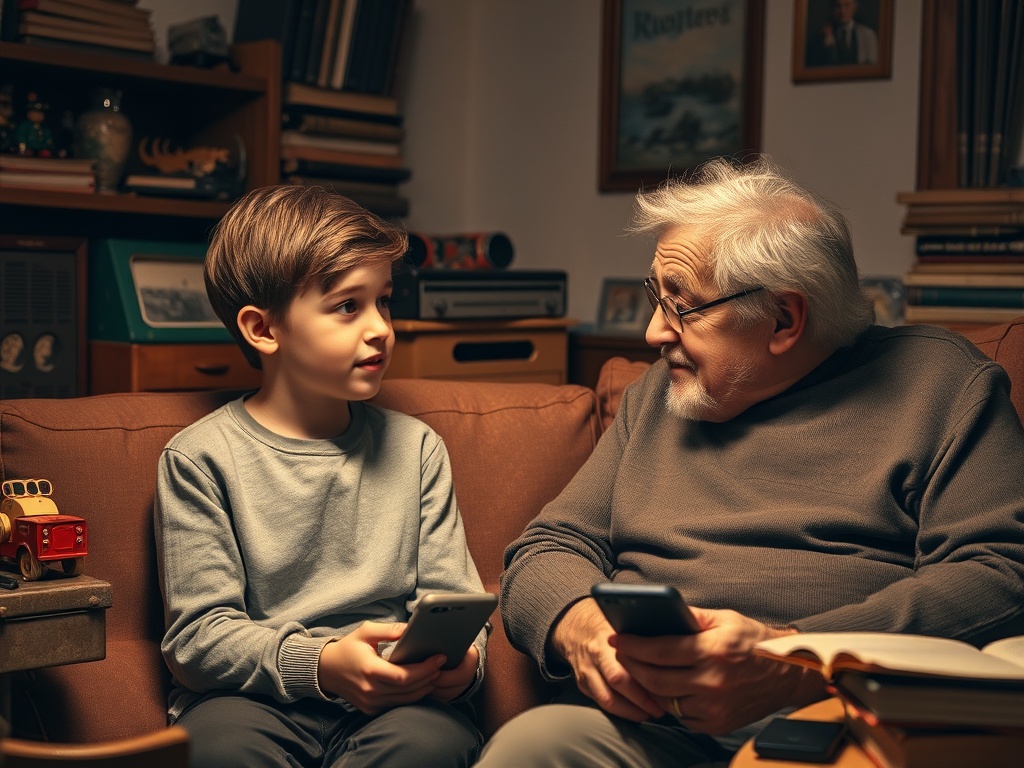Reflections on Generational Differences

When my eldest child, Charlie, requested a sip of beer or a taste of Guinness to mark his 16th birthday earlier this month, I was momentarily transported back to my own teenage years. I vividly recall hosting a house party, where I downed half a bottle of Malibu (or was it Mirage?) and snogged seven boys during an enthusiastic game of spin the bottle.
In stark contrast, my son seems to lead a remarkably different life. As far as I know, he has never had a girlfriend, and he hasn’t touched any alcohol, nor has he smoked a cigarette or used a vape. Perhaps I am blissfully naive, but Charlie and his friends, all students at his co-ed grammar school, appear to be quite sensible. Their weekends are filled with football matches, competitive shouting at the PlayStation, and rummaging through local flea markets and town hall sales in search of “vintage” 90s gear.
While I hesitate to tempt fate—and perhaps the worst is yet to come—I can’t help but wonder if my son is missing out on something by leading such a sheltered life in comparison to my own rebellious teenage years. Back then, I was sneaking small bottles of Smirnoff or Bacardi into pubs to mix with my Coca-Cola and sneaking off to the Hilton hotel to buy cigarettes from the vending machine (or occasionally pilfering them from my mum). The thought of all the precarious situations I found myself in sends a shiver down my spine.
Those wayward teenage escapades shaped my formative years and likely instilled in me a healthy dose of cynicism and a streetwise outlook that I carried into adulthood. In contrast, my son and his friends represent what many refer to as “generation sensible.” According to a recent study, they are arguably more conservative than their predecessors. While my generation, Gen X (though I identify more as a Xennial, having been born in the late 70s), reveled in booze, grunge, and raves, Gen Z seems to prioritize health and fitness over reckless partying.
Interestingly, the study revealed that a third of Gen Zers believe couples should be married before having children, and less than a quarter have engaged in one-night stands or casual relationships. Moreover, only one in ten expressed a desire to work in a traditional office setting, a stark contrast to the Gen X experience, where office romances and after-work drinks were considered rites of passage.
This year, Charlie’s birthday coincided with the second round of his mock GCSEs, so we’ve decided to let him celebrate more fully once they’re over. He’ll be heading to a water park with 11 friends, followed by a pizza party and a sleepover at our home. Given that we live in a small village with limited public transport options, I doubt any of them will attempt to sneak off into town or smuggle girls through the bedroom window.
As I anticipate the evening, I don’t expect to get much sleep, and I can already imagine the house filled with the unmistakable scents of socks, questionable odors, and a hint of Lynx body spray. It’s a far cry from the raucous teenage antics of my own youth in the rebellious 90s, and I find myself torn between amusement and horror.
Our parents were often oblivious to our whereabouts, and thankfully, there were no smartphones to document our every move. In contrast, Gen Z has grown up under the watchful eyes of social media and helicopter parenting, with their every action monitored and often scrutinized. Perhaps this constant surveillance and the fear of having any indiscretion shared online contribute to their more cautious and sensible choices.
Although I was raised under what my late mother jokingly referred to as “healthy neglect,” I appreciate the ability to track my son’s whereabouts. There are times when he ignores my calls yet expects me to be available at a moment’s notice, making it quite useful to know where he is.
Social media plays a dominant role in their lives. A recent survey by Morning Consult found that Gen Z spends an average of four hours a day on social media, with platforms like YouTube, Instagram, TikTok, and Snapchat being the most popular. Despite being more connected than ever, they also report feeling lonelier, with a study by think-tank Onward indicating that 16- to 24-year-olds are three times more likely to feel lonely “often or always” compared to those aged 65 or older.
Furthermore, we cannot overlook that younger Gen Zers, including my son and his peers, belong to the Covid cohort. He effectively missed his last year of primary school due to lockdowns, and pivotal milestones, such as leaver assemblies and school dances, were canceled. His first year of secondary school was similarly disrupted by intermittent lockdowns, which may explain why they seem more cautious and risk-averse than their parents.
Thankfully, my son appears to be content, and I’m grateful that he has a fantastic group of friends to spend time with, even if their activities don’t mirror the wild adventures of my youth. Perhaps they are better off for it.
I’m not sure I would want my son to engage in reckless behavior—getting drunk, kissing girls, and stumbling out of pubs as I once did. I wonder if they even possess the skills to use fake IDs as we did or if he could convincingly shave a few years off his age when asked. I suspect he wouldn’t be able to purchase beer without raising eyebrows or attracting unwanted attention. And he might find Malibu a bit too sweet for his taste.
Ultimately, who is to say which generation has it right? Each of us is shaped by our unique experiences and the times in which we live. I wouldn’t have it any other way.




